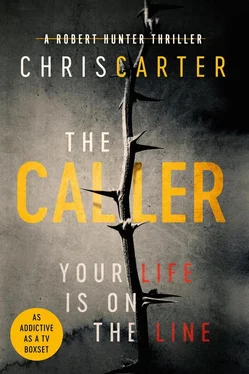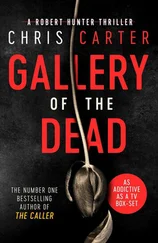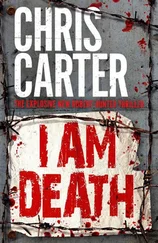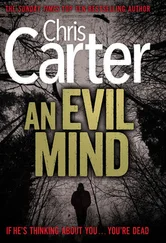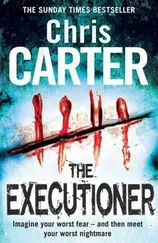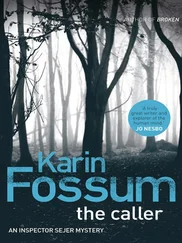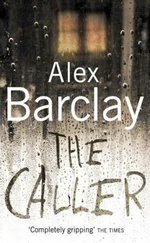Webb checked every room as carefully as he could, including inside wardrobes and behind shower curtains. All clear.
‘OK,’ he said, getting back on to his feet after looking under Dr. Barnes’ bed. That was the last place he had to check. ‘The house is clear, Doctor. There’s no one here.’
She finally stepped into her bedroom and looked back at him with a mixture of gratitude and embarrassment. She felt so mentally tired, she was beginning to doubt her own thoughts.
‘Thank you,’ she said, not knowing what else to say. She was sure that Detective Webb had considered all of this to be a huge waste of time, but she could tell that he was a caring and committed police officer. Back at the station, he could’ve ended their interview within five minutes, but he didn’t and she was sure she knew why.
Webb had read the fear in her eyes. He had noticed the discomfort in her movements and despite what he believed and how busy he was, he still gave her all his attention. He gave her every benefit of the doubt. In a way, he did to her what she did to all her patients — he listened to whatever problem she brought him, regardless of it sounding crazy or not, and he tried his best to help her. The fact that he had accompanied her to her house just so she could feel a little more secure was a clear indication of that.
Webb walked over to the double glass doors that opened on to her backyard. They were securely locked. He then made his way to the large window on the east wall. Also locked. He turned to face Dr. Barnes.
‘All locked, Doctor, but I’ve got to be honest with you. I don’t want to scare you or anything, but your locks aren’t great quality.’ He lifted his hands, already aiming to calm her down. ‘They are fine, please don’t get me wrong, but they can be breached.’
‘You don’t want to scare me with a statement like that?’
Webb’s hands stayed up. ‘It sounds worse than it is. All I’m trying to say is that if you really are concerned for your safety and for the safety of your house, you could consider upgrading your locks.’
‘You said that these could be breached?’ she asked, anxiously.
‘Not by just anyone.’ Webb again tried to calm Dr. Barnes down. ‘One would need the knowledge of how to and the correct tools.’
‘But somebody could’ve done it, right? Somebody could’ve opened one of my windows from the outside, or even one of the doors?’
‘Technically, yes, but then again, with the right knowledge and the correct tools, safes can be breached.’
Dr. Barnes considered Webb’s statement. He was right, she could be overreacting; nonetheless she made a decision right then to upgrade all of her locks, and maybe even get the house alarmed. She nodded back at him.
‘Could I maybe offer you a coffee?’ she asked.
Webb checked his watch. It was late. Too late. He needed to get going.
‘I’d love one, but I do need to get back to the station.’
‘Are you sure?’ she insisted. ‘It will take me just a couple of minutes. I had the coffee at your station. It tasted like it’s been filtered through a dirty diaper.’
Webb laughed. ‘That’s because it probably has. I don’t think anyone really knows who makes that coffee. I don’t think anyone really wants to know.’
Dr. Barnes smiled at him.
Webb checked his watch one more time.
‘How about if I take a rain check on that coffee?’ he asked. ‘How about tomorrow? That way I can check on you again, make sure everything is fine.’
Dr. Barnes’ smile widened as she nodded.
‘Sure. Tomorrow sounds great.’
‘Is six o’clock OK?’
The doctor had the whole day off.
‘Yep. That works for me.’
‘Great,’ Webb said, walking towards the bedroom door. ‘I’ll see you tomorrow then.’
Detective Webb exited Dr. Barnes’ house and jumped into his unmarked police car. As he turned on the engine, he smiled internally. This had been a lot easier than what he’d imagined.
The two-story house was located at the end of a quiet street in Granada Hills — a somewhat rich neighborhood on the San Fernando Valley portion of Los Angeles. In a cab, even at that time of night and with traffic considerably reduced, it took Hunter about fifty-five minutes to cover the distance between where he was and the address he was given to Cassandra Jenkinson’s house.
As the cab turned left on to Amestoy Avenue and approached Flanders Street on the right, the driver geared down and looked at Hunter through the rearview mirror.
‘Damn, man, something big is going down where you’re going. PD is all over the joint like flies on shit.’
Hunter nodded. ‘Yeah, I know. That’s why I’m here.’
The driver’s stare left the mirror and he twisted his neck to look at Hunter. ‘You a cop?’
Hunter didn’t reply. In his head, this just didn’t make any sense. The phone call he had received had come from Captain Blake herself. She had told him that their investigation had just escalated into a multiple homicide with a serial pattern, because they now had a second victim. If that was really the case, then they had to have been wrong in most of their assumptions so far.
A marginal number of stalkers reached what was known as the sixth phase of stalking — aggression and violence towards humans. Once that phase was reached, avoiding thoughts like ‘if I can’t have her/him then no one else can either’ would become almost impossible, and fantasizing about killing the subject of their affection would begin to torment them. But even out of those who’d entertain such morbid thoughts, few would actually act on it. The ones who did, in the aftermath of their actions were nearly always overwhelmed by a feeling of such guilt and sadness they tended to isolate themselves for weeks, months, sometimes years. Some would also punish themselves in some way. But stalkers were people with obsessive personalities and, almost inevitably, after the guilt and sadness had finally dispelled, they would once again turn their obsessive attention on to a brand new subject and the chances of that murderous cycle repeating itself were high, very high.
But it had been just three days since Karen Ward had been murdered, not weeks, months, or years. Three days, which meant one of two things — either this killer was not Karen Ward’s stalker, even though she did have one, or he stalked multiple subjects at once, which was extremely rare but not unheard of.
From the backseat of the taxi, Hunter quickly studied the scene.
Flanders Street had been completely cordoned off, but the yellow crime-scene tape that established the police perimeter extended at least another forty-five yards on either side of the street entrance. Black and white units seemed to be parked just about everywhere.
The media had also already received word of the murder and a couple of news vans, with TV cameras being set up on their roofs, had strategically claimed their spot on the sidewalk, directly across the road from the cordoned-off street. Three photographers, all armed with telescopic lenses, were tirelessly walking from one end of the perimeter line to the other, searching for a shot, but the distance and the position of the Jenkinsons’ house made the task a virtual impossibility. Nonetheless, none of them seemed like they were about to give up any time soon.
A small crowd, who looked to be filming and photographing everything on their cellphones, ready for the ‘obligatory’ upload to the never-ending number of social media sites, had already gathered by the crime-scene tape.
At the south entrance to Amestoy Avenue, two policemen were busy coordinating traffic and signaling every curious driver who slowed down to keep on moving.
Читать дальше
